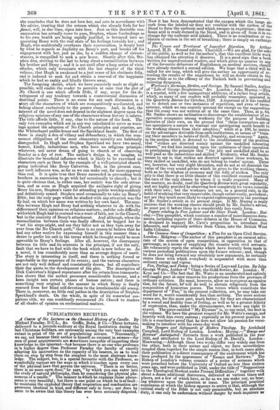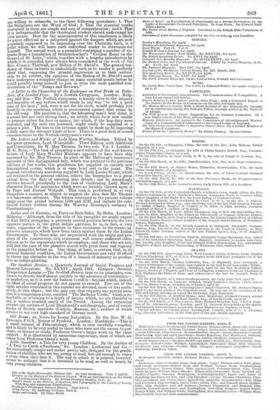she concludes that he does not love her, and acts
in accordance with Now it has been demonstrated that the oxygen which the lungs ab- sorb from the inhaled air does not combine with the carbon of the his advice, trusting that the esteem which she already feels for her blood to form the carbonic acid which escapes in expiration ; that car_ boneacid is ready-formed in the blood, and is given off from it in ex- summation has actually come to pass, Stephen, whose forebodings as and which gives no quarter to any
will be cording the results of the experience he will no doubt obtain in the that the essay was not written all at the same time. Thus, at p. 64, Mr. Smiles shows an inclination to discourage the establishment of co- well paid as gm industrious and skilled." Evidently, what Mr. Smiles means to say is, that strikes are directed against those workmen, be
they skilled or unskilled, who do not belong to trades' unions. These characters such as these by the example of a well-principled church- are, however, but very slight blemishes, and do not at all diminish the going individual like Bessy Calverton. But, in the present case, value of the very sound advice which he gives to the working classes, any such influence was, as far as we can make out, far more apparent both as to the wisdom of economy and the folly of strikes. The only than real. It is quite true that Bessy succeeded in persuading both pity is that there is so little chance of this excellent counsel reaching brothers in succession to go with her occasionally to church ; but it the ears of the only classes by whom it is really required Many of is quite obvious that, in either ease, her society was the sole attrae- the masters, no doubt, read the Quarterly Review with great regularity, tion, and as soon as Hugh acquired the exclusive right of giving and are highly gratified by observing how completely its views coincide Besse his arm, Stephen's taste for attending public worship suddenly with their own ; but the workmen are not, as a general rule, in the and definitively ceased. Stephen used occasionally to take up Bessy's habit of studying that very respectable, though rather costly, periodical; Bible, but the only page which he studied with any attention was the nor are they much more likely to expend eighteenpence in the purchase
of Mr. Smiles's article in its present shape. If Mr. Murray is really fly-leaf, on which her name was written by her own hand. The sepa- anxious that the working classes should profit by Mr. Smiles advice, of all shades of opinion on ecclesiastical matters. by a sound and healthy tone of feeling, as well as by a greater felicity of expression, than, under the circumstances, we have any right to expect. Thepiece entitled " My Elysium" is, to our mind, the best in
PUBLICATIONS RECEIVED, the volume. We have the greatest respect for Mr. Watts's energy, and heartily wish him every success ; especially as his present position in A Conree of Six Lectures on the Chemical History of a Candle. By life is a conclusive proof that he does not allow his passion for verse- Michael Faraday, D.C.L., &c. Griffin, Bohn, & Co.—These lectures, making to interfere with his every-day work.
are willing to subscribe to the three following postulates : 1. That the Scriptures are the Word of God; 2. That the essential truths contained in them are simple and easy of comprehension; and 3. That it is indispensable that the theological student should understand his own nature. How far the announcement of this conclusion is likely to prove effectual as a safeguard against the dangers which are now popularly supposed to be impending over the Christian faith, is a
cint which we will leave each individual reader to determine for self. The second work is a pamphlet containin& a number of ex- tracts from a translation of Schleiermacher's "Critical Essay on the Gospel of St. Luke," which, together, with a lengthy introduction by which it is preceded, have always been considered as the work of the Rev. Connop Thirlwall, now Bishop of St. David's. The general ten- dency of these extracts is undoubtedly such as to render it perfectly clear that, supposing the general impression as to their author- ship to be correct, the opinions of the Bishop of St. David's must have undergone a complete change on many essential points before he could possibly bring himself to join in even the most qualified con- demnation of the "Essays and Reviews."
A Letter to the Chancellor of the Exchequer on Free Trade in Table- Beer, of a Limited Price. By a Norfolk Clergyman. London : Ridg- way and Son.—The Norfolk clergyman is keenly alive to the iniquity and impolicy of any system which tends in any way "to rob a poor man of his beer ;" and, were it not for his cloth, would probably join heartily in the anathema which is pronounced against that crime by the old song. His position is, that the labouring man's best drink is a sound but not over strong beer; an article which he is now unable to procure either for love or money, but which, if the hop duty were repealed, and the malt tax lessened, might easily be supplied at a penny a pint. The loss to the revenue might be made up by imposing a duty upon the stronger kinds of beer. There is a good deal of sound common-sense in the Norfolk clergyman's views.
The Letters and Works of Lady Mary Wortley Montagu. Edited by her great-grandson, Lord Wharneliffe. Third Edition, with Additions and Corrections. By W. Mop Thomas. In two vols. Vol. I. London : H. G. Bohn.—The task of preparing a new edition of the well-known letters of Lady- Mary Wortley Montagu appears to have been ably executed by Mr. Moy Thomas. In place of Mr. Dallaway's inaccurate memoirs of this distinguished lady, which was prefixed to the previous editions of her works, this gentleman has supplied an entirely new biographical notice, which is at once brief and to the point. The copious introductory anecdotes supplied by Lady Louisa Stuart, which are retained in the present edition, relieve the biographer to a great extent from the duty of entering into details; and he accordingly- devotes himself principally to the task of vindicating Lady Mary's character from the aspersions which were so lavishly thrown upon it by Pope and Horace Walpole. This task is performed in so very temperate a manner, as almost to suggest the idea that Mr. Thomas is a lukewarm advocate. The letters contained in the present volume range over the period between 1709 and 1727, and include the cele- brated letters written during Mr. Wortley Montagu's embassy to Constantinople.
Indigo and its Enemies; or, Facts on Both Sides. By Delta. London : Ridgway.—Although, from the title of his pamphlet we might expect to find Delta occupying a precisely central position between the two opposite parties in the great indigo question, he is, in fact, a very warm supporter of the planters in their resistance to the recent ag- gressive measures which have been taken against them by the Indian Government. To those who are acquainted with the origin and pro- gress of the controversy, this statement will convey sufficient infor- mation as to the arguments which he employs; and those who are not, will find the case of the planters stated with great force and cogency in the pamphlet before us. One thing, at least, is certain, that, in its present financial condition, the Indian Government can very ill afford to throw any obstacles in the way of a branch of industry so produc- tive as indigo-planting.
The Scottish Review: a Quarterly Journal of Social Progress and General Literature. No.XX.XIV.' April, 1861. Glasgow: Scottish Temperance League.—The Scottish Review, true to its principles, con- tinues to devote itself almost entirely to the advocacy of teetotalism— or nephalism, as it is now the fashion to call it—beyond which, indeed, its ideas of social progress do not appear to extend. Five out of the eight articles contained in this number are devoted, more or less exclu- sively, to this object; but the only one that requires any special men- tion is a temperance story, entitled " The Bachelor Uncle," which is re- markable as attaining to a depth of fatuity which, we are thankful to say, is seldom reached south of the Tweed. Among the remaining articles are notices of Lord Dundonald's autobiography, and of recent books of Scotch anecdote (Carlyle, Ramsay, &c.), neither of which attains to any very high standard of literary merit.
Old Bones; or, Notes for Young Naturalists. By the Rev. W. G. Symonds, F.G.S., Rector of Pendock. London: Hardwicke.—This is a small manual of Palaeontology, which is very carefully compiled, and is likely to be very useful to those who have not the means to pur- chase, or leisure to study, Professor Owen's larger work on the same subject. It is illustrated by numerous engravings, most of which are taken from Professor Owen's work. Little Sunshine: a Tale for very young Children. By the Author of "A Trap to Catch a Sunbeam," &c. London : Lockwood and Co.— An exceedingly simple and rather pretty tale, designed for the gratifi- cation of children who are too young to read, but old enough to enjoy a story when they hear it. The way in which it is printed, however, seems to indicate that it is intended to be read, as well as heard, by very young children.































 Previous page
Previous page